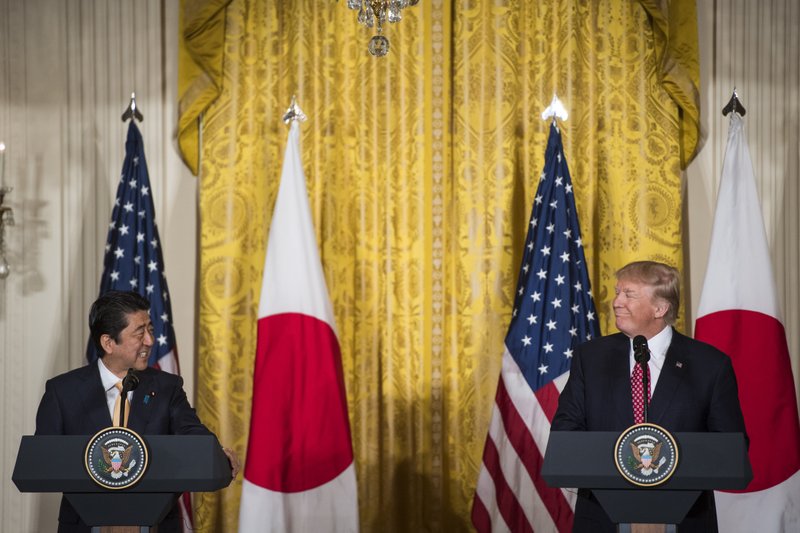President Donald Trump will welcome Japanese Prime Minister Shinzo Abe to Mar-a-Lago this week in an effort to shore up their relationship ahead of Trump's potential summit with the leader of North Korea.
Abe is set to arrive Tuesday at Trump's resort in Palm Beach, Fla., for two days of meetings as concerns mount in Tokyo that Trump's diplomatic gambit with Kim Jong Un could undermine Japan's security. Abe also was blindsided by Trump's decision not to grant Japan a waiver on new steel and aluminum tariffs, as he did for other U.S. allies and partners.
The double whammy left some in Tokyo questioning Abe's strategy of cozying up to the American president. Abe was the first foreign leader to visit Trump after the election, and the two have met and spoken 20 times -- more interactions than Trump has had with any other world leader. It is Abe's second visit to Mar-a-Lago, after meetings and a round of golf last year.
Now, the question is whether Abe's influence will endure in the face of the whirlwind geopolitical maneuvering of East Asian leaders, including South Korean President Moon Jae-in, a liberal who has led the push for more diplomatic engagement with the Kim regime, to the consternation of Tokyo. Moon and Kim are scheduled to meet later this month, and Kim recently visited Chinese President Xi Jinping in Beijing.
Takao Toshikawa, a veteran political journalist in Tokyo, said the conservative Abe's immediate task was to use his face time with Trump to ameliorate fears of "Japan passing" -- the notion that the United States is prepared to downgrade its bedrock security ally in favor of other priorities. Toshikawa employed the phrase "Japan dissing" to describe Trump's recent moves.
"The summit [this week] will be the most important of his tenure," he said, noting that it was difficult for Abe to prepare for the meeting because Trump is so unpredictable.
"If Trump makes rapid progress in his talks with Kim, that could put Abe in a very disadvantageous position. Abe is afraid of that," Toshikawa said. "So Abe should tell Trump that Japan and the U.S. need to act as one and urge Trump to understand Japan's position on North Korean issues, as well as economic issues."
[PRESIDENT TRUMP: Timeline, appointments, executive orders + guide to actions in first year]
Trump aides played down suggestions of a rift. The two leaders will open with a meeting, followed by several working sessions that include their national security teams. Topics include trade, energy and China, as well as North Korea. Among those expected on the U.S. side are national security adviser John Bolton, U.S. Trade Representative Robert Lighthizer and Vice President Mike Pence.
On North Korea, Abe is determined to set guardrails for Trump in his talks with Kim. In visits to Washington over the past several weeks, Japanese government officials have emphasized that the United States must maintain tough economic sanctions on the North and not reward Pyongyang merely for its willingness to talk.
Japanese officials are intent on ensuring that Trump pushes to reduce the threat posed by the North's short- and medium-range missiles, in addition to its nuclear arsenal and intercontinental ballistic missiles. And Abe also will emphasize human rights, including the unresolved abductions of at least 13 Japanese by North Korean agents in the 1970s and '80s.
Trump has denounced North Korea's treatment of Otto Warmbier, an American college student who was detained by the Kim regime for 17 months and died shortly after his release in a coma last year. Three other Americans remain in captivity.
"We are not out of the loop -- we are closing the loop," insisted a senior official close to Abe who was not authorized to speak on the record.
Former State Department officials who have negotiated with North Korea under previous administrations warned that Pyongyang will present its own demands. Those could include the lifting of economic sanctions, a formal peace treaty, pledges by the United States to ensure the Kim regime's survival and a reduction of the U.S. military presence on the peninsula. It is also unclear how the United States would be able to verify North Korea's compliance with any deal to freeze or dismantle its weapons program.
Michael Green, who served as senior Asia director at the National Security Council in the George W. Bush administration, said Japanese officials told him Abe will "warn about the rhetorical traps Kim will set that would be extremely damaging to Japan. One would be accepting Kim Jong Un's promise to denuclearize the Korean Peninsula. That does not mean anything."
Abe has pursued a strategy that his best bet on influencing Trump is through constant reinforcement. Abe was at Mar-a-Lago in February 2017 when North Korea launched its first missile test of the Trump administration, and Trump joined him that evening for a joint statement denouncing the action.
A Section on 04/15/2018
